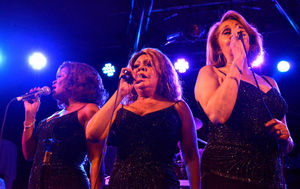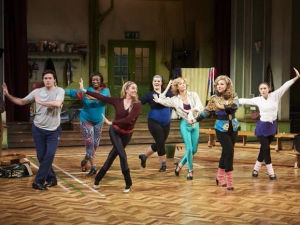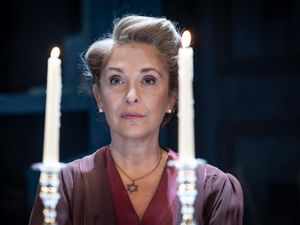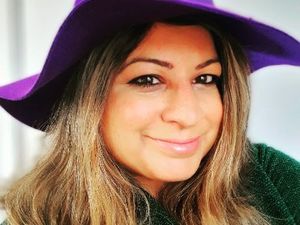Reprising the glory years with their hits: The Three Degrees talk ahead of 40 Years Of Disco 2 tour in Birmingham
Time flies. It’s been 40 years since the charts were dominated by disco. But for bands like The Three Degrees, it feels like only yesterday. The all-girl American group from Pennsylvania achieved 13 Top 50 hit singles between 1974 and 1985 and counted Prince Charles among their biggest fans. Hits like When Will I See You Again and Woman In Love made them major stars and they’ll reprise their glory years when they play Birmingham’s Resorts World Arena on March 24.

The Three Degrees will feature as part of 40 Years of Disco 2, which will feature fellow disco stars Village People, The Trammps, Imagination, The Gibson Brothers, Eruption and The Real Thing.
Disco started in the early 70’s in the clubs of New York with Studio 54, which opened in 1977, being the most famous. The same year the ‘Disco Fever’ album spent six weeks at No.1 and was still there at Christmas.
The Three Degrees had a string of hits including Giving Up, Giving In, The Runner, Take Good Care Of Yourself, My Simple Heart, Year Of Decision, Woman In Love and the No. 1 When Will I See You Again.
More than three decades on, the ladies have retained everything that made them special — their beauty, their sparkling choreography and their precise vocal qualities. And, in between, they have amassed an impressive list of hit records.
Prince Charles publicly acclaimed The Three Degrees as his favourite group tagging them Charlie’s Angels. And they are the longest running female vocal group in history as confirmed by Guinness Book of Records. Today, the line-up consists of Valerie Holiday, Helen Scott and Freddie Pool.
Performing
Helen is looking forward to being back on stage. “Oh yes, absolutely. I am always looking forward to it. We really do like performing. We always look forward to doing just that. The fact that we get to perform with people that we know and don’t always get to see makes it even more fun. I think I will probably do a little bit of watching and a bit of hanging out. There’s nothing like the experience you get when you’re out in the crowd watching your favourite bands. With these disco shows, we’ll go all out with the hair dos and the costumes. It’s a powerhouse-packed evening. I think the crowd is in for a treat.”
Helen started out in 1963, when the band formed, before leaving three years later. She returned in 1976 and has been an ever-present since then, along with Valerie Holiday.
“I have to tell you, they were just fun days. I don’t think any of us had ever thought it would turn into what it is today. I think we all just kind of belonged to choirs and glee clubs and just liked to sing. I think that’s what we thought we were doing. I don’t think we thought it would go on an international level or across the States. We thought it would just be local. We were 15-16, so what did we know?
“Our first live performances were at record hops. You would perform in schools with dancers. Then when we moved on to nightclubs and that was a bit scary because we were still teenagers. We were only allowed to work on the weekends because everybody was still in school. It was kinda scary.”
They were part of a wave of Motown and Philly music that swept around the world. “Motown kind of started a lot of trends, if you will. It’s because they had that wonderful sound that people could sing to and dance to. Philly international kind of piggy-backed off that concept, though not the sound. The sound was different. I think the Philly sound was more of a funky kind of disco sound. Motown was more poppy. Both of them crossed over and there were similarities. Motown had a large black roster and so did Philly international. A lot of the rap acts today sampled the Philly sound.”
Helen’s understandably proud that she’s maintained her career across so many years, playing to millions of fans and shipping millions of records.
“I think that everybody, if you’re any kind of an artist, gets a buzz from what they do. Musicians are artists. We paint pictures for people. You have to paint a picture of a conversation. Anybody who is in music definitely wants that one little piece of the pie that gives them longevity.
“We’re proud of the hits. A song like When Will I See You Again will always be there for us. It gave you that little extra niche that carries you through time. I know that all three of us and the people who were here before, we are all grateful for that. I had the pleasure of going to an awards ceremony to thank the people who wrote that song.
“But when you look back to the 1970s, it was a perfect time. Disco was something we’d never done. We worked with great producers and we were blessed. We’d been able to come up through the ranks from the 60s and enjoy hits. We became international, I’m eternally grateful.”
The Three Degrees were renowned not just for their music: they were also the most glamorous ladies this side of Diana Ross.
“You have to remember that during the 60s and prior to that, glamour was 100 per cent a part of showbiz. It was not just how you sounded it was how you looked. People wanted to see and hear a full picture. Our manager at the time was a stickler for elaborate hair-dos and dresses. There were some times where we thought he had lost his mind, but it worked. For me, personally, I don’t have a problem with people being comfortable on stage but there’s nothing nicer than looking good, it takes you an extra step up. The audience wants to see a little glitz and glamour.”
And what about Prince Charles? How does she rank his fandom among the band’s many achievements. “Oh well – I have to say that for me, being described by Prince Charles as his favourite group was the highlight of our career. The Royals invited us to charity events and we loved that. We performed for just about everybody in there. We went to the wedding for Charles and Di. We were the only Americans there other than Nancy Regan.”





